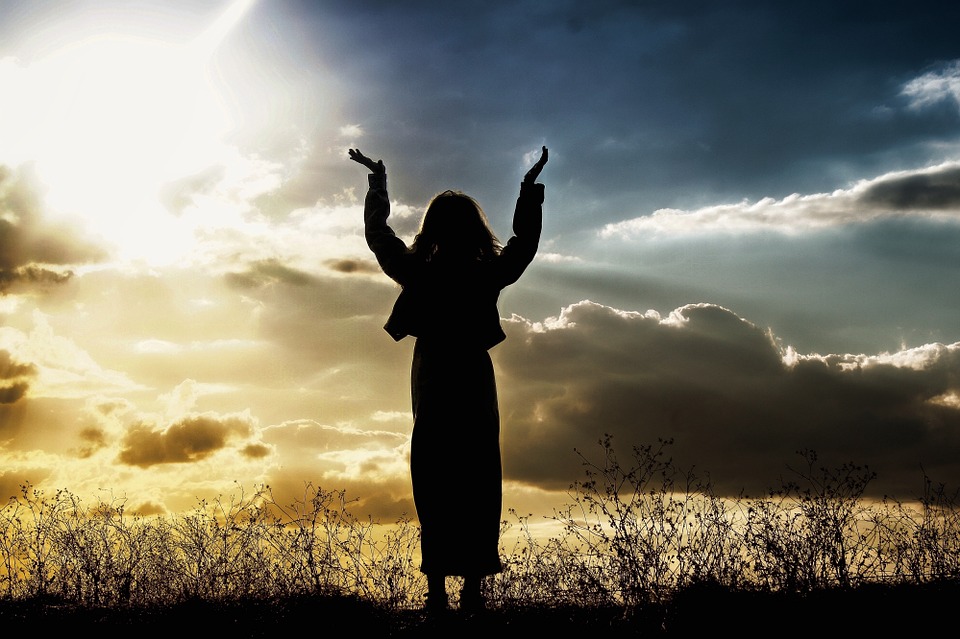The last three Parashot “אחרי מות, קדושים, אמור” provides us with a divine teachings, meaning after holy people die, only then we may say that they were truly righteous people. The Gemara teaches that Nadav and Avihu were the most holy people in the congregation of Israel, and that they were compared to the seventy members of the Sanhedrin combined. Moshe’s request that everyone in Bnei-Yisrael mourn their death alludes to their holiness. In the second verse we notice how humble HaShem is, and how He places Bnei-Yisrael first before Himself. HaShem speaks to Moshe and commands him to clarify to the entire congregation of Israel that they should be holy, and only then will they understand that I am holy (just as they are) and I am their HaShem: “בְּנֵי-יִשְׂרָאֵל, וְאָמַרְתָּ אֲלֵהֶם–קְדשִֹׁים תִּהְיוּ: כִּי קָדוֹשׁ, אֲנִי יְהוָה אֱלֹהֵיכֶם”. So first we see that HaShem places Bnei-Yisrael first, “Kedusha” (“קדושה” – holiness) second, and HaShem third. This comes to teach us that the entire creation was meant for Bnei-Yisrael, as HaShem truly loves His people and that He is willing to place them first and set these conditions in order to provide them with Torah.
Parashat Kedoshim קְדֹשִׁים has 64 verses and 51 Mitzvot, 13 positive (do’s) and 38 negative (don’t) Miztvot. The number 46 in numerical value represent “Godly Assistance” in Hebrew called “סיעתא דשמיה” “Si’atah De’Shemiah” ס”ד which also alludes to the word “סד” “Sod” (secret). Our first word Kedoshim קְדֹשִׁים (holy people) speaks about a husband and wife. The Zohar explains that while they are Kedoshim (holy), they’ll merit holy children. The Zohar points out that the best time to conceive and fulfill the Mitzvah of procreation is on Friday night after midnight, when the Shabbat is at its highest level.
The word “Kedusha” is made out of two Hebrew words, “Kadosh” (“קדוש” – holy) and “HaShem” (“ה” – God). When we keep such a Mitzvah of Kedusah, we keep HaShem’s will and He in return will treat us as Holy. The word “Alehem” (“אלהם” – to them) in the second verse is also made up of two Hebrew words, “EL” (“אל” – HaShem) and “Heim” (“הם” – for them). HaShem will be their God and will fulfill all that He promised to Bnei-Yisrael just as the word “Mal’ie” (“מלא” – full) is also hidden in the same word. We notice here that HaShem combines three elements of holiness: Himself, the parents, and the Shabbat. To teach us of such an important foundation of Jewish life and its true divine purpose, and by honoring all three we honor the whole Mitzvot. We also learn from the words “Be holy because I am Holy” (“קְדשִֹׁים תִּהְיוּ: כִּי קָדוֹשׁ, אֲנִי יְהוָה אֱלֹהֵיכֶם”), a profound teachings by our Sages. HaShem hints to Bnei-Yisrael that at times they will have different level of Kedusha (holiness), as it will be determined by their actions. Yet, they must always know that HaShem remains at the highest possible levels of Kedusah and forever be their God.
Now that Bnei-Yisrael understood that they are “holy” and refrained from sins and forbidden relations, they should also elevate themselves and do all the allowed things with moderations and self-restraint. They should not take advantage of their “holiness”, but behave modestly and not proudly. The word “Kedoshim” eludes also to the kind of holiness Bnei-Yisrael posses at this moment in time as well as in the future. Just as in word “Kedoshim” there is another word hidden, the word “Mikdash” (“מיקדש”) speaking of Beit-Hamikdash. The public teaching of this “Kedusha” is the importance of all that is depended on it, as everyone is obligated to keep. We know that all these laws are mentioned before in the Torah, yet by keeping our holiness we make sure that these Mitzvot are kept and furthermore, they are kept correctly.
Here we see an extra two words used in the first verse “Kol Adat” (“כל עדת” – in addition to Bnei-Yisrael) which teaches us that Moshe gathered only the Twelve Tribes. We know that from the word “Kol” (“כל” – all) that has numerical values of 50 same as the total combined letters in the 12 tribes’ names. It is also interesting to learn that the word “Kedoshim” has the same letters of the word “Shokedim” (“שקדים” – diligent people) meaning people who are very learned and knowledgeable, also known as “עם הספר” “Am HaSefer” people of the “book”, the Torah.
HaShem places such an honor on our parents as He immediately speak of the respectful “fear” we shall have towards our mother and father, as it is written “אִישׁ אִמּוֹ וְאָבִיו תִּירָאוּ”. A question was asked “Why HaShem first mentions the mother first and the father second, unlike in the Ten Commandments, where the father is mentioned first. HaShem is teaching us a beautiful parable: The “Mother” is the Torah and the “Father” is HaShem. When we respect our parents we actually respect HaShem, along with the Torah and the Mitzvot, as it says in Mishliy (משלי 6:20), “My son, keep the commandment of your father, and do not leave the teaching Torah of your mother” “נצור בני, מצות אביך; ואל-תיטוש תורת אימך” (interestingly, the verse’s placement in Mishliy is 6:20, and 620 is the numerical value of the word “Keter” (“כתר” – crown), alluding to HaShem’s glory. When we respects our parents we actually respect Him and its holiness, along with the Torah and Mitzvot. We know that the Mitzvah of “כיבוד אב ואם” Kibud Av & Em (respecting parents) appears on the same side of Ten Commandments (right side), HaShem’s side. Interesting to point out that the “Right” side in the Ten Commandments is the Good inclination and the “Left” side is the Bad inclination (Satan).
With the commandment of respecting our parents, we are exempt from obeying them if they order us not to observe the Shabbat (and other laws transgressing HaShem commandments). This is the main reason the placement of “fearing our parents” came after the commandment of keeping the Shabbat. The reason the Torah teaches us that we must “fear” our mother first (here), is to make sure that we do so (fear our mother) as usually kids by nature already fear their father. HaShem bestows a tremendous responsibility on the Jewish parents, as he places them within the portion of “Kedusha”. However, we are exempt from obeying our parents if they order us not to observe the Shabbat (or to transgress any of HaShem’s commandments). We notice here that HaShem is giving again the first five commandments, just in a different order. In Parashat Yitro we have the original order of the first five of the Ten Commandments:
- I am Hashem your God.
- You shall have no other gods before me.
- You shall not misuse the name of the Hashem your God.
- Remember the Sabbath day by keeping it holy.
- Honor your father and your mother.
In our Parasha we see a different order, especially with regards to the following:
- Bnei-Yisrael – You shall not misuse the name (by not being holy) of the Hashem your God.
- I am Hashem your God.
- Honor your father and your mother.
- Keeping the Sabbath.
- You shall have no other gods before me.
The Zohar teaches us that Moshe wrote for Bnei-Yisrael three sections of Mitzvot containing sixty Mitzvot each: the Mitzvot of Passover sacrifice, the laws of damages and the laws of Kedoshim in our Parasha. We also learn from the Zohar that we are forbidden to associate with people who lack faith and “Kedusha”, meaning that “forbidden to associate” is speaking of relationship for procreation as they will produce offspring whose Neshamah comes from defilement. When HaShem commanded Bnei-Yisrael to be “Holy” He meant for us not to be like animals and other nations. Only when we are constantly studying Torah, we will be holy, as the Torah guards us from all defilements. We are also forbidden to associate or conduct business with people who lack faith and “Kedusha”, as they might not behave according to the Torah’s laws and might be dishonest and unethical, because those who do not have the Torah in their lives fail to honor themselves and HaShem. We all know the famous saying: “You are judged by the company you keep. King David, who wrote most of the chapters in the book of Tehilim, said in chapter 1:
תהילים פרק א
א אשרי האיש– אשר לא הלך, בעצת רשעים;
ובדרך חטאים, לא עמד, ובמושב לצים, לא ישב.
ב כי אם בתורת יהוה, חפצו; ובתורתו יהגה, יומם ולילה.
ג והיה– כעץ, שתול על-פלגי-מים
We learn that King David was referring to our three Forefathers: Happy is the man that hath not walked in the counsel of the wicked (Avraham), nor stood in the way of sinners (Yitzchak), nor sat in the seat of the scornful (Yaakov). In their merit we will be redeemed B”H.
Our Parasha speaks of many fundamental Mitzvot who deal both with HaShem and fellowmen. Being the Chosen people and holy people we must live with the highest integrity and set an example to all the other nations. We know that many of the gentiles do not even keep the basic seven Noachide laws that HaShem provided to help them maintain a rule of law and moral lives. Today, many nations who do not follow HaShem’s seven Noachide laws live a poverty-stricken and animalistic life style. Nowadays, we are witnessing tsunamis, earthquakes, typhoons, hurricanes and other disasters in places that are filled with idolatry and sex-crimes. It seems as if HaShem just “moved His hand above the ocean or below the earth” and hundreds of thousand of people vanish in a moment. When HaShem commands us to be “Kedoshim”, in a sense He elevates us above all the nations and forever we will be considered holy to Him and to ourselves. We are ordered to sacrifice a peace-offering to HaShem and we must do it with love and in the correct way. Such scarifies must be eaten on the same day or the next day at the most. It teaches us that these scarifies are as holy to HaShem as we are. Eating these sacrifices is part of HaShem’s divine energy that he created in the world, for us to serve HaShem.
When HaShem created the world, He first created all the vegetation and the animals, and only then He created mankind. This teaches us that all was created for our sake, and we must respect it as it is too has a divine sparks, a “Kedusha”. When we eat the Korban, and other foods, we bring sparks of godliness by blessing and elevating it. HaShem, in His divine teachings, instructs us to provide the less fortunate with part of our harvest, and we should always recognize that everything we have is a gift from HaShem. This Mitzvah comes to teach us a profound lesson, that we are first to feed the “less fortunate”, just as HaShem with His mercy provides for us all in order to survive. We must be as holy as He is and give to the less fortunate ones as we are provided by Him. The Gemara teaches us that when we see something out of the ordinary, it came to point out how lucky are the ordinary ones.
By giving us such divine Torah and Kedusha, HaShem wanted to teach the entire world about the extraordinary of his true purpose of creating the world, the Torah and Bnei-Yisrael. We, the people of Israel must always live by example and teach the rest of the world about HaShem’s ways. We see here that Moshe once again explains all the laws of dignity among the people and how to deal honestly with each other. The Torah’s divine laws provide us with such a pure way of loving and treating each other, just as HaShem treats us when we obey His commandments, His laws and His Mitzvot.
All that we are commanded to do is to have a dignified life, as seen in the commandment of “VeAhavtah L’Reacha Kamocha” (“ואהבת לריעך כמוך” – you shall love your fellowman as you would love yourself). Rabbi Akiva said: “this is a major principal in the Torah”. We also see that when we are commanded not to hate our fellowmen even in our heart (in verse 19:17, ולא” תשא עליו חטא”). We are actually warned not to “carry” such sin. We must rebuke one discreetly and not “raise” the sin above him, just as we wouldn’t like the same done to us. We see in verse 19:17 the law of “You should reprove your fellowman”. The word in Hebrew “Hocheach” (“הוכח”- reprove) has the numerical value of 39, just as a guilty man would be subject to 39 “Malkot” (מלקות – lashes) for his sins. We must always think about those 39 lashes before we reprove our fellowman as we might be deserving of such 39 lashes ourselves. Interesting to point out that the 39 are also the same amount of the Shabbat prohibitions.
The Midrash teaches us that upon our passing the Neshamah, it arrives in front of HaShem, and few of questions is asked (some opinions say six) by Him:
I Were your (business) dealings have been truthful and honest?
II Did you set time to study Torah daily?
III Did you expect the arrival of Mashiach?
The Sages teach us that these questions are really one question, explaining that one who studies Torah shall always deal honestly with his fellowmen. HaShem chose here to remind us that we were salves in Egypt. The question is, why? To teach us that just as we witnessed how the Egyptians were never honest in their “dealings” with Bnei-Yisrael, we shall never imitate such dishonesty. We must always remember that we are Holy to HaShem and “Sparks of Kedusha” to the rest of the world.


























